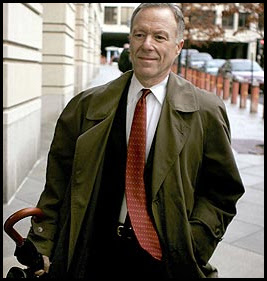 I. Lewis "Scooter" Libby will not serve a day in prison for his felony convictions of perjury and obstruction of justice. President Bush yesterday commuted Libby's 2.5 year prison sentence, hours after an appeals court ruled that Libby could not delay serving his jail time while he appealed his convictions. Bush's commutation comes at a noteworthy time. Three years ago this week, former Ambassador Joseph Wilson published his New York Times op-ed revealing that the Bush administration had "twisted" intelligence "to exaggerate the Iraqi threat."
I. Lewis "Scooter" Libby will not serve a day in prison for his felony convictions of perjury and obstruction of justice. President Bush yesterday commuted Libby's 2.5 year prison sentence, hours after an appeals court ruled that Libby could not delay serving his jail time while he appealed his convictions. Bush's commutation comes at a noteworthy time. Three years ago this week, former Ambassador Joseph Wilson published his New York Times op-ed revealing that the Bush administration had "twisted" intelligence "to exaggerate the Iraqi threat."For this act, which began to expose how Bush misled the nation into war, Wilson became the target of an aggressive White House smear campaign that culminated in the outing of his wife Valerie Plame, a covert CIA officer. Arthur Brown, a CIA division chief who retired in 1995, described the actions taken against Plame as the "moral equivalent to exposing forward deployed military units." Yet when federal investigators tried to investigate this potential grave national security crime, they ran into a roadblock: Vice President Cheney's chief of staff Scooter Libby.
Special Prosecutor Patrick Fitzgerald compared Libby's lying and obstruction to throwing sand in an umpire's eyes. "He's trying to figure what happened and somebody blocked their view." Now Bush, who once pledged to "return the highest standards of honor to the highest office in the land," has condoned this criminal conduct, to the cheers of leading conservative politicians and pundits around the country.
SELECTIVE COMPASSION: "I respect the jury's verdict," Bush said in a statement yesterday. "But I have concluded that the prison sentence given to Mr. Libby is excessive." This explanation "only underscored the way this president is tough on crime when it’s committed by common folk," the New York Times opines.
As governor of Texas, Bush infamously joked about the impending execution of Karla Faye Tucker, a killer who became a born-again Christian on death row. ("Please don't kill me," Bush whimpered to a reporter while imitating Tucker, "his lips pursed in mock desperation.") As president, Bush has repeatedly put himself and his administration above the law, on matters from torture and warrantless domestic spying to congressional oversight and the use of signing statements. Bush's treatment of Libby's sentence is extraordinarily rare by his own standards.
"Bush has granted fewer pardons -- 113 -- than any president in the past 100 years, while denying more than 1,000 requests." In addition, Bush has "denied more than 4,000 commutation requests, and hundreds of requests for pardons and commutations are still pending."
A DEEPLY UNPOPULAR DECISION: Bush's disregard for the rule of law is not popular. A SurveyUSA instant poll found just 21 percent of Americans agree with the decision to commute Libby's prison sentence. Sixty percent said Bush "should have left the judge's prison sentence in place," and only 17 percent wanted a full pardon.
'EXCESSIVE' PUNISHMENT: Bush's claim that Libby's sentence was "excessive" doesn't hold water. As Fitzgerald pointed out yesterday, "this case was imposed pursuant to the laws governing sentencings which occur every day throughout this country."
In this case, a federal judge appointed by Bush "considered extensive argument from the parties and then imposed a sentence consistent with the applicable laws," Fitzgerald wrote. "It is fundamental to the rule of law that all citizens stand before the bar of justice as equals."
Ohio State University law professor Douglas Berman, an "expert on federal criminal sentencing policies," said Bush's excuse is "hypocritical and appalling from a president whose Justice Department is always fighting" attempts by judges and lawmakers to lower the punishment called for under federal sentencing guidelines. Berman said Bush's message amounted to, "My friend Scooter shouldn't have to serve 30 months in prison because I don't want him to."
No comments :
Post a Comment